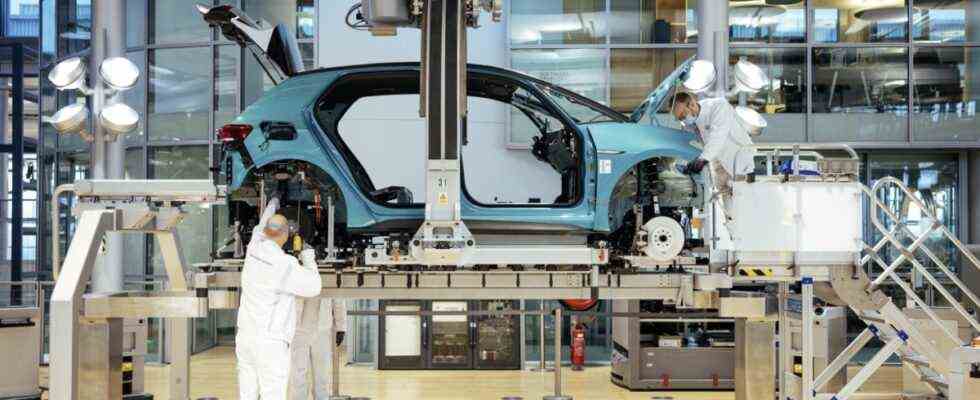Belonging to the middle class is a German longing goal. This combines dreams like steadily more salary, nice vacation trips and your own property. Three quarters of Germans count themselves among the middle incomes. The reality is different: the middle is shrinking, advancement is becoming more difficult – and young Germans in particular are often excluded. This is shown by a study by the Organization for Economic Cooperation and Development (OECD) and the Bertelsmann Foundation, which raises questions for the new government.
The researchers have x-rayed the republic and are making some diagnoses. It starts with the size of the coveted social class. Three quarters of Germans belong to the middle? Are you kidding me? Are you serious when you say that. The middle class is shrinking – from 70 percent of the population in the mid-1990s to just 64 percent in 2018. The decline mainly occurred in the 1990s, when there were many unemployed, companies fled collective wages and the welfare state was dismantled. But that is no cause for hope. Because in the ten years up to the Corona crisis, the economy was booming. But the middle did not increase again.
“The middle is shrinking everywhere in the industrialized countries,” explains the economist Branko Milanović in books such as “The Unequal World”. Globalization and modern technology are putting factory and office activities under pressure. Wages are stagnating. Or people even have to switch to poorly paid jobs from security to the supermarket. From 2000 to 2014, the average disposable income in Germany, and thus the standard of living, did not increase – previously unthinkable. The study by Bertelsmann and OECD shows that the proportion of medium-sized jobs in industrial companies is falling. She defines the middle in such a way that couples with two children belong if their monthly earnings are between 3,000 and 8,000 euros.
Nations with a strong middle are happier – and have less crime
Germany in particular has always been so proud of its middle class, which was bigger than in other industrialized countries. Even a millionaire like the CDU politician Friedrich Merz counts towards it, although he is clearly part of the upper class. The middle keeps the state going because it pays in more taxes and contributions than it gets out of social benefits. Researchers have found that middle-class societies have higher levels of satisfaction with life and healthier residents – and fewer crime.
But younger people in particular are increasingly barred from the coveted social class. The proportion of middle-income aged 18 to 29 year olds fell by more than ten percent. It is also a question of the year of birth. Among the baby boomers who were born between 1955 and 1964, seven out of ten made it into the middle class after starting their careers. In the case of millennials, i.e. those born between 1983 and 1996, there are only six out of ten. Education plays a central role in this. Those who complete an apprenticeship but do not have a degree are more likely to fail than in the past. Without an apprenticeship or high school diploma, you are usually outside.
It has not only become more difficult to get into the coveted class of society. Those in the lower middle class in particular slip away from it more easily – one in five people in the typical working age.
Recently, however, there have been research results that show the situation more positively. The union-affiliated Economic and Social Science Institute (WSI) points out that incomes grew noticeably from 2014 to the Corona crisis. A large majority of those who were in the middle continued to be among them many years later. “After the decline and shrinking of the middle class were a frequent topic, the situation eased in the later 2010s,” says WSI director Bettina Kohlrausch.
Such assessments are partly related to the fact that the middle class is defined differently. The Bertelsmann Foundation and the OECD, the think tank of industrialized countries, are skeptical of their findings. Higher risk of relegation – and a lack of mobility upwards: “If you drop out of the middle class in Germany, it is much more difficult today to get up again,” explains co-author Valentina Consiglio.
What can be done to stabilize the middle – and to increase economic security and satisfaction among Germans? This is a political issue with explosives. Experts like Branko Milanović consider the decline of the middle class to be the main reason why right-wing populists from AfD to Trump have gained so much popularity in recent years. The question is thus addressed directly to the traffic light coalition in Germany: What should it do for the middle class?
A training guarantee like in Austria could help
On the plus side, for example, it says that the minimum wage of twelve euros will increase income. Every fifth full-time employee who lives in a middle household works at low wages. In the lower income group, the proportion is even four times as high.
The researchers from OECD and Bertelsmann have several proposals for the government on how to strengthen the center. It starts with education. Every seventh young citizen starts their job without training or a high school diploma. The number of apprenticeship contracts is shrinking, whereas a training guarantee like in Austria could help – the traffic light takes it upon itself.
The researchers also believe that the foreseeable need for nurses and childcare providers could become an engine for good middle-class jobs. To do this, however, it is necessary to pay more for these professions.
And then there is the fact that the central government is digging into its wallet – and labor income is taxed heavily. The government could lower taxes and instead burden capital income and abolish exemptions from inheritance tax, the researchers suggest. So far, however, this has remained a pious wish: the traffic lights could not agree on tax cuts for the center.

